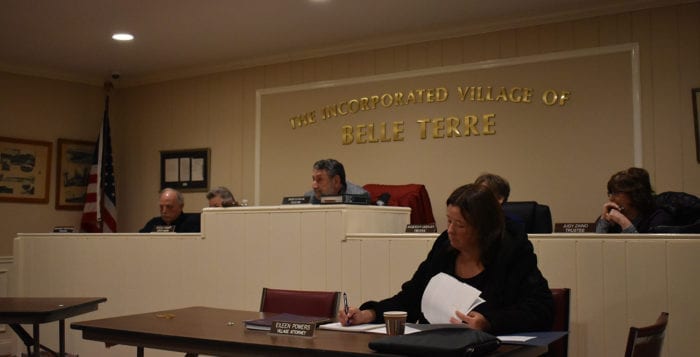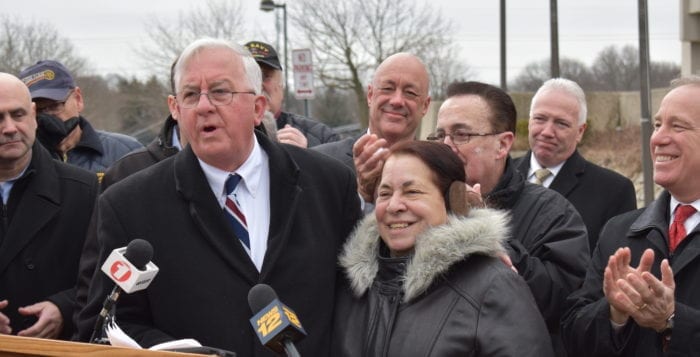Brookhaven Town Councilwoman Jane Bonner (R-Rocky Point), a longtime civic leader and six-term council member since 2007 is facing a challenge from Democratic Sarah Deonarine, a marine biologist out of Coram with years of working in state and local government.
In an October debate at the TBR News Media offices, candidates went back and forth over questions of development on the North Shore, clean energy initiatives and keeping young people on Long Island.
“What I’m hearing is that people want to stay in their homes — age in place.”
— Sarah Deonarine
Deonarine said she sees Brookhaven at “full carrying capacity” in terms of development and is calling for a study on capacity to see if the town is at “full build-out.” She added that another issue which leads to the Island’s brain drain is a lack of affordable or millennial housing, compared to states like Colorado.
“What I’m hearing is that people want to stay in their homes — age in place,” she said.
Other issues for her is the lien put on a property after a derelict house is removed, making redevelopment expensive. She asked that the list of zombie homes in town be made public, as well as refocus Brookhaven Code Enforcement Division which she called aggressive in “trying to make money for the town.”
Bonner instead cited the Route 25A corridor study, and which started in the first years of her first term, which she boasted has been picked up by the Town of Riverhead and continued by Councilwoman Valerie Cartright (D-Port Jefferson Station) in the Three Village area. The study led to “massive rezonings” which limited further build-out. She said all current large-scale developments were grandfathered in before the outcome of the study.
One of those includes the senior living facility development going up along Route 25A in Mount Sinai, which came about after the Mount Sinai Civic sued the town to stop another “Ranches style” development. The Mount Sinai Meadows project was reconfigured from retail space into majority millennial-geared rental/part commercial.
“Mount Sinai Meadows is going to change the face of Mount Sinai,” Bonner said. “It’s also going to stimulate the [Mt. Sinai] shopping center that’s right next to it.”
She disagreed with Deonarine’s statement on code enforcement, saying the division was more focused on the well-being of people in their homes. She said Suffolk County police asked the town not to publicize the list of zombie homes.
The town has boasted of its clean energy initiatives, including solar farms and wind farms at Town Hall in Farmingdale. Bonner called the solar farm developments in Shoreham a way of reducing the impact of farms and grass products on the aquifer while growing green energy in the town. She mentioned the electric car charging stations at sites like Heritage Park in Mount Sinai.
“We’re doing our part to reduce our carbon footprint.”
— Jane Bonner
“We’re doing our part to reduce our carbon footprint,” the incumbent said.
The Democratic challenger said she thinks it’s time Long Island as a whole moves away from being hesitant on new green energy initiatives, especially with complaints over aesthetics.
“People are afraid of their views being blocked — it’s a time we need to move past that, and it’s time to think about the environment and move away from fossil fuels,” she said.
If elected, Deonarine said she would bring a different viewpoint to the board, six of whom are Republican with one lone Democrat. She also pushed her opponent on proposition 1, the referendum given the green light by voters last November, saying it had been poorly worded, giving town council members term limits while at the same time extending terms from two to four years. She said the Republican members of the board largely supported it, and though Cartright had at first supported it, she later pulled back her support.
“The current board makeup, and current Republican Party makeup, it is very biased,” she said. “With only one Democrat on the board, that’s not a representation of the Town of Brookhaven.”
Bonner said the board has been bipartisan in getting things done, with no lack of ability or willingness to cross party lines and help each other in daily duties. In terms of proposition 1, “we all supported to go to referendum for the four-year terms,” she said. “It was overwhelmingly supported by nearly 60 percent.”























